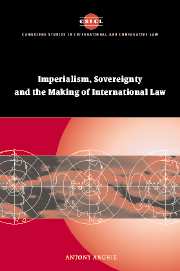Book contents
- Frontmatter
- Contents
- Foreword
- Acknowledgements
- Table of cases
- Table of treaties
- Introduction
- 1 Francisco de Vitoria and the colonial origins of international law
- 2 Finding the peripheries: colonialism in nineteenth-century international law
- 3 Colonialism and the birth of international institutions: the Mandate System of the League of Nations
- 4 Sovereignty and the post-colonial state
- 5 Governance and globalization, civilization and commerce
- 6 On making war on the terrorist: imperialism as self-defence
- Conclusion
- Bibliography
- Index
- CAMBRIDGE STUDIES IN INTERNATIONAL AND COMPARATIVE LAW
Conclusion
Published online by Cambridge University Press: 05 August 2012
- Frontmatter
- Contents
- Foreword
- Acknowledgements
- Table of cases
- Table of treaties
- Introduction
- 1 Francisco de Vitoria and the colonial origins of international law
- 2 Finding the peripheries: colonialism in nineteenth-century international law
- 3 Colonialism and the birth of international institutions: the Mandate System of the League of Nations
- 4 Sovereignty and the post-colonial state
- 5 Governance and globalization, civilization and commerce
- 6 On making war on the terrorist: imperialism as self-defence
- Conclusion
- Bibliography
- Index
- CAMBRIDGE STUDIES IN INTERNATIONAL AND COMPARATIVE LAW
Summary
[T]o him the meaning of an episode was not inside like a kernel, but outside, enveloping the tale which brought it out only as a glow brings out a haze, in the likeness of one of those misty halos that sometimes are made visible by the spectral illumination of moonshine.
The Peace of Westphalia has a defining significance for the discipline of international law. It is the ‘Westphalian model’ of sovereignty, created as a means of resolving conflicts among European powers, that has preoccupied international lawyers over the centuries in their analysis and elaboration of the founding concept of the subject. This model, which asserts that all sovereigns are equal and exercise absolute power within their own territory, has in time produced the haunting problem: how is order created among sovereign states? It is the ‘Westphalian model’ of sovereignty, further, that has generated histories of the discipline that broadly present the non-European world in terms of the process by which sovereignty, established in the European centre, extends to incorporate that non-European world. I have attempted in this book to sketch an alternative history of sovereignty, a history that focuses not on events in Europe but on the colonial confrontation between non-European and European societies.
This book argues that colonialism was central to the constitution of international law and sovereignty doctrine. In developing this argument, I focus on the rhetoric of the ‘civilizing mission’ that was such an indispensable part of the imperial project.
- Type
- Chapter
- Information
- Imperialism, Sovereignty and the Making of International Law , pp. 310 - 320Publisher: Cambridge University PressPrint publication year: 2005

